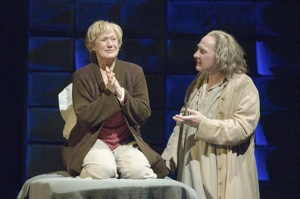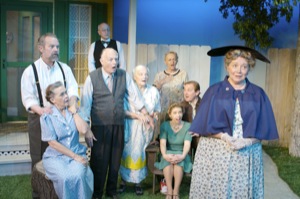-
- Backers of California same-sex marriage ban ready to submit petitions
- Lance Bass speaks out against discrimination
- Lab suggests HIV spreads faster than researchers thought
- Court hears lesbian custody case
- Red Cross’ rejection of gay student sparks protests, conflict
- Company refused to photograph same-sex couple, cites religious beliefs
- National News Briefs
- World News Briefs
Theater
The fascination of genius and celebration of the ordinary
Published Thursday, 24-Apr-2008 in issue 1061
‘33 Variations’
The nature of obsession and genius, traced through the parallel stories of Ludwig van Beethoven and a fictional musicologist, make a fascinating piece of theater in 33 Variations, written and directed by Moisés Kaufman. The show plays through May 4 at La Jolla Playhouse’s Mandell Weiss Theatre.
In 1819, wealthy music publisher and composer Anton Diabelli (Don Amendolia) asked 50 Viennese composers to contribute one variation on a little waltz he had written. Better businessman than composer, Diabelli smelled profit in a compilation of variations by the best composers of the day, along with perhaps a measure of immortality in his piece as source.
The others (including Schubert, Chopin and Czerny) began work immediately, but Beethoven sent it back with an insulting comment about its inadequacy. Then a funny thing happened: for some reason, Beethoven became obsessed with the project, and over the next four years wrote 33 variations on it. Known as the “Diabelli Variations,” they comprise what many consider the most important set of piano variations in the literature.
Kaufman wanted to know what many scholars have asked: why the sudden obsession with “that insignificant little waltz,” particularly since Beethoven, having just completed the “Missa Solemnis,” was also working on his masterpiece, “Symphony No. 9”? So Kaufman invented a fictional alter ego in academic Katherine Brandt (Jayne Atkinson) to investigate. The result is 33 Variations.
What dazzles here isn’t the somewhat tame plot or the good dialogue; it’s the parallel structure that crosses century lines to have the characters occasionally interlocking ideas and sentences, even sharing problems of art, work, illness and family. Kaufman even gives them parallel physical problems: Beethoven will go deaf during the four years of composition on the variations; Katherine’s ALS (Lou Gehrig’s disease) will get progressively worse.
Played out on a terrific set depicting the Beethoven archives in Bonn (where Katherine goes to look at the master’s sketches and notebooks of the period), Kaufman adds other interesting characters in Dr. Gertie Ladenburger (Susan Kellermann), librarian of the archives (the old reliable dragon of the archives image); Katherine’s daughter Clara (Laura Odeh), concerned about her mother’s failing health; Katherine’s young male nurse Mike Clark (Ryan King); and Beethoven’s assistant Anton Schindler (Erik Steele), overworked, berated and eventually fired.
One unusual (and most welcome) touch is the addition of concert pianist Diane Walsh, who sits to the side and plays about two-thirds of the variations during the play, while Beethoven’s scores are projected onstage.
The play could do with tweaks and judicious cuts – two and a half hours is pushing it for a modern play. And there’s more about illness and less about Beethoven than I’d like. But even as is, 33 Variations is a captivating piece of theater.
The American Theatre Critics Association has named 33 Variations the best new American play yet to be produced in New York. The award comes with a $25,000 cash prize, the largest national cash prize for playwriting.
33 Variations plays through May 4 at La Jolla Playhouse’s Mandell Weiss Theatre. Shows Tuesday and Wednesday at 7:30 p.m.; Thursday through Saturday at 8 p.m.; Sunday at 7 p.m. Matinees Saturday and Sunday at 2 p.m. For tickets call (858) 550-1010 or visit www.lajollaplayhouse.org.
‘Morning’s at Seven’
The charm of the ordinary is on display in Paul Osborn’s Morning’s at Seven, onstage through May 11 at North Coast Repertory Theatre, directed by Tracy Williams.
Set in two Midwestern backyards in 1938, Morning’s at Seven gives us a look at the lives of four aging sisters and their assorted family members. Cora (Veronica Murphy) and Theodore/Thor Swanson (Todd Blakesley) have shared their home for some 40 years with Cora’s never-married sister Aaronetta/Arry Gibbs (Lynne Griffin), a fact which has made Cora increasingly lonely and unhappy.
The other backyard belongs to Ida (Diane Sinor) and Carl Bolton (Jonathan McMurtry), who share their house with their 40-year-old hopelessly indecisive and dependent son Homer (Sean Sullivan), engaged for 12 years to a girl named Myrtle Brown (Crystal Sershen), whom no one in the family has met.
Carl drives Ida crazy with occasional “spells” in which he leans his head against a solid surface, lamenting his life path with anguished cries of “Where am I?” and talks of going back to take that other fork in the road.
Carl has built a house for Homer and his future bride – a lovely house which has sat unoccupied for the past 12 years – and it’s beginning to look like it will never be lived in. Cora, tired of her domestic ménage à trois, has designs on renting the house with Thor (and getting away from Arry), at least until Homer makes up his mind.
The eldest and smartest sister, Esther/Esty Crampton (Dagmar Krause Fields), lives up the street with husband David (Eric Poppick), a snotty academic who considers Esty’s whole family (excluding Carl) “morons” and only allows her to visit when he approves. Needless to say, they are her life and she sneaks out to see them.
The play’s title comes from Robert Browning’s dramatic piece Pippa Passes, two of whose lines are “Morning’s at seven” and “All’s right with the world.” All is not right, either in the poem or with this family, and in the second act the chinks become visible.
The drama is set in motion when Homer finally brings the hitherto-unseen Myrtle home to meet the family. Mother Ida of course assumes this means what it traditionally has meant and asks about the wedding date, which sends the nearly inarticulate Homer into a spell of his own.
Until 1980, Osborn was best known for his screen adaptations (East of Eden, Sayonara, South Pacific). A 1980 revival of Morning’s at Seven (which lasted only 44 performances in first run) won three Tonys and revived his reputation as a playwright.
It isn’t often we celebrate the ordinary (these days, the extraordinarily awful and incredibly silly seem to hold sway), but Osborn’s charming characters are capital-O ordinary, and from a time long gone. That’s their strength, because when the sadness comes, Osborn exaggerates it until it looks downright funny. These characters have an innate innocence and down-home approach that make them recognizable to all audience members.
Well acted and intelligently directed, Morning’s at Seven reminds us how alone we can feel, even surrounded by those we love.
Morning’s at Seven plays through May 11 at North Coast Repertory Theatre. Shows Thursday through Saturday at 8 p.m.; Sunday at 7 p.m.; matinees Saturday and Sunday at 2 p.m. For tickets call (858) 481-1055 or visit www.northcoastrep.org.
|
|
Copyright © 2003-2025 Uptown Publications



